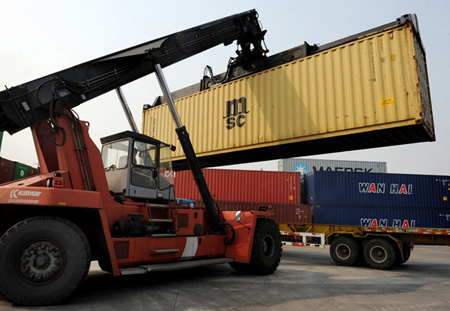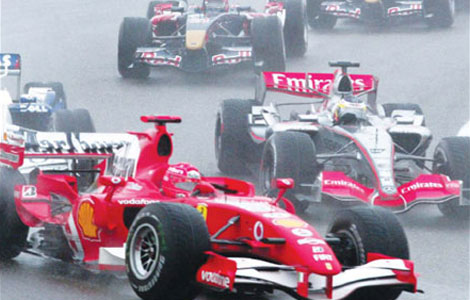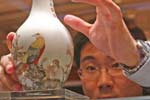Economy
Inflation remains key risk to economy
Updated: 2011-04-12 09:11
By Zheng Lifei (China Daily)
|
 |
|
container is moved at Yiwu International Distribution Center in Zhejiang province. Exports jumped 35.8 percent and imports climbed 27.3 percent year-on-year in March, the General Administration of Customs said on Sunday.[Photo / China Daily] |
The growth in exports and imports may provide another tool to curb price rise
BEIJING - China's faster-than-expected growth in exports and imports last month may allow the government to strengthen its fight against inflation, which probably exceeded its target for the ninth straight month in March.
Overseas shipments jumped 35.8 percent and imports climbed 27.3 percent year-on-year, unexpectedly pulling the trade balance into surplus after a $7.3 billion shortfall in February, the customs bureau said on Sunday.
"March export figures came in stronger than expected, shrugging off the impact of Japan's disaster and the surge in oil prices," said Qu Hongbin, chief China economist at HSBC Holdings Plc in Hong Kong. "This reconfirms that inflation rather than growth remains the key risk for China. Get ready for more reserve ratio and rate hikes in the coming months."
The government will use reserve requirement ratios, interest rates and foreign-exchange rates to "eliminate the monetary basis for inflation", Premier Wen Jiabao said during a visit to Zhejiang province on April 9, according to a report by the Xinhua News Agency. Wen reiterated that controlling prices is his top economic priority after food and housing costs surged, threatening social stability.
Investors are growing confident that the economy can tolerate monetary tightening, with China's benchmark stock index climbing about 9 percent since the first of two interest-rate increases this year. The index's advance has beaten the 0.6 percent gain in the Standard & Poor's 500 Index and a 1.4 percent drop in the MSCI Asia Pacific Index.
Consumer prices climbed 5.2 percent in March, according to the median estimate in a Bloomberg News survey, and if that is the case, CPI would exceed the government's 2011 target of 4 percent for the third month. The statistics bureau is due to release the data on April 15.
Inflation in China is "causing some serious danger of wage-price inflation", billionaire investor George Soros said on Sunday at a conference in New Hampshire. "It would be very advantageous to allow the currency to appreciate as a way of controlling inflation," said Soros, chairman of Soros Fund Management LLC.
Higher commodity prices contributed to the nation recording its first quarterly trade deficit since 2004, underscoring the case for yuan gains to help contain prices, analysts said. Inbound crude oil shipments in the first quarter rose 12 percent by volume and 39 percent by value to $43.7 billion year-on-year. The cost of iron ore imports jumped 82.5 percent to $27.7 billion while the amount of metal climbed 14.4 percent year-on-year, customs data showed.
The People's Bank of China (PBOC) has raised interest rates four times and boosted banks' reserve requirement ratios six times since early October. Credit Suisse Group AG forecasts the benchmark one-year deposit rate, which has risen 1 percentage point to 3.25 percent, will climb another 1.5 percentage points by the end of the year.
A report this week may show China's gross domestic product expanded 9.4 percent in the first quarter from a year earlier, according to the median estimate in a Bloomberg News survey. The economy grew 9.8 percent in the fourth quarter.
There's "little risk of a hard landing", Paul J. Heytens, China country director of the Asian Development Bank, said last week, citing "robust" growth in industrial production, retail sales and real-estate investment.
Expansion will ease to 9.6 percent this year from 10.3 percent in 2010 as the government's fiscal stimulus winds down and monetary policy is tightened, the Manila-based lender forecast.
"The better-than-expected exports and imports should remove concerns there will be a rapid economic downturn," Dong Xian'an, a former chief economist at Industrial Securities and now at the Beijing-based Peking First Advisory, said in a note on Sunday.
|
||||
US policymakers have pressed China to allow quicker gains in the yuan to help narrow trade imbalances.
The PBOC set the yuan's daily reference rate against the dollar at 6.5401 on Monday, a record high for the seventh straight trading day. The yuan has gained more than 4 percent against the dollar over the past 12 months and about 26 percent since July, 2005, when China reformed its yuan exchange rate policy.
"China is still facing strong pressure from imported inflation," said Liu Li-Gang, an economist at Australia & New Zealand Banking Group in Hong Kong who formerly worked for the World Bank. "While the authorities can use fiscal subsidies to offset this, the exchange rate tool is more effective to contain imported inflation."
Last week, the Organization for Economic Cooperation and Development said that economic recovery among the world's most advanced economies is gathering strength. The Paris-based body forecast the Group of Seven economies, excluding Japan, probably expanded an annualized 3.2 percent in the first quarter and 2.9 percent in the second.
Bloomberg News
E-paper

Green light
F1 sponsors expect lucrative returns from Shanghai pit stop
Buying into the romance
Born to fly
Light of hope
Specials

Share your China stories!
Foreign readers are invited to share your China stories.

No more Mr. Bad Guy
Italian actor plans to smash ‘foreign devil’ myth and become the first white kungfu star made in China.

Art auctions
China accounted for 33% of global fine art sales.




